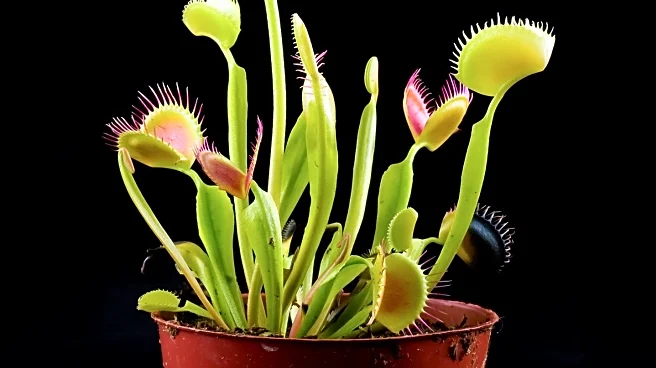What's Happening?
The Mid-Atlantic Carnivorous Plant Society (MACPS), founded by Kevin Zhang, recently hosted its first plant show at Haverford College in Pennsylvania. The society, which boasts about 80 dues-paying members
and 1,200 followers on Facebook, is dedicated to the cultivation and appreciation of carnivorous plants. These plants, known for their ability to trap and digest insects, have fascinated enthusiasts like Zhang since childhood. The event attracted over 700 attendees, including scientists, teachers, and children, who share a passion for these unique plants. The show featured lectures, plant auctions, and displays of various carnivorous species, with awards given for the best specimens.
Why It's Important?
The growing interest in carnivorous plants reflects a broader trend in horticulture and plant collecting, offering a unique niche for enthusiasts. Carnivorous plants, which have evolved to thrive in nutrient-poor environments, provide educational opportunities about plant biology and ecology. The MACPS event highlights the community aspect of plant collecting, fostering connections among enthusiasts and promoting ethical practices in plant acquisition. As many carnivorous species face threats from poaching and habitat loss, societies like MACPS play a crucial role in conservation efforts and raising awareness about sustainable practices.
What's Next?
Following the success of the first plant show, MACPS plans to continue hosting events that bring together carnivorous plant enthusiasts. Future activities may include more plant auctions, educational lectures, and field trips to natural habitats. The society aims to expand its membership and influence, encouraging ethical plant collecting and conservation. As interest in carnivorous plants grows, MACPS may collaborate with botanical institutions and conservation groups to further its mission of preserving these unique species.
Beyond the Headlines
Carnivorous plants offer a fascinating glimpse into evolutionary biology, showcasing adaptations that allow them to thrive in challenging environments. The community around these plants is diverse, attracting individuals from various backgrounds who share a common interest. The ethical dimension of plant collecting is significant, as many species are endangered due to illegal poaching. Societies like MACPS emphasize the importance of transparency and sustainability in plant acquisition, contributing to broader conservation efforts.









